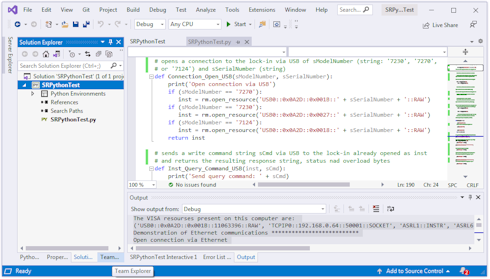Python Driver Software
 This
free driver software makes it easy to implement instrument
communications with
SIGNAL RECOVERY lock-in amplifters from
code written in Python. It uses the industry standard VISA software
communications platform (typically NI-VISA) and the PyVISA Python
extension to allow commands to be written to the lock-in and the
responses read via RS232, GPIB, USB or Ethernet interfaces.
This
free driver software makes it easy to implement instrument
communications with
SIGNAL RECOVERY lock-in amplifters from
code written in Python. It uses the industry standard VISA software
communications platform (typically NI-VISA) and the PyVISA Python
extension to allow commands to be written to the lock-in and the
responses read via RS232, GPIB, USB or Ethernet interfaces.
The supplied code consists of a driver file which can be run directly from the command line using the Python interpeter, as well as a Visual Studio 2019 workspace containing the same file which can be easily run and debugged in that IDE. Users can then use the portions of the code appropriate for the interface they wish to use in their own Python projects. The software is supplied complete with a 12 page PDF instruction manual which describes the operation of individual functions and the overall program.
Specifications
The driver requires Python
version 3.8 or later, PyVISA 1.10.1 or later, and a suitable VISA
package (e.g. NI-VISA) to be installed on the development machine. It
will operate via
either the RS232, GPIB (IEEE-488), Ethernet, or USB interfaces the
models 5110(A), 5209, 5210, 7124, 7220, 7220BFP, 7225, 7225BFP, 7230, 7260,
7265, 7270, 7280, and 7280BFP.
Connecting up...
To use the driver, make sure
that you have a suitable Ethernet, USB, RS232 or GPIB cable and GPIB
interface card and/or interconnecting cables.
- Model CE0115S USB-GPIB Adaptor Cable
- Model CE0114S National Instruments PCI-GPIB Interface Board
- Model SC0073S 2m GPIB cable
- Model SC0067S 4m GPIB cable
- Model SC0066S 1m GPIB cable
- Model 796190 USB A/B 6' (2m) Cable
- Model C01002 9F - 25M Null Modem RS232 cable (for models 5110, 5209, and 5210)
- Model C01003 9F - 9M Null Modem RS232 cable (for models 7220, 7260, 7225, 7265, 7124, 7230, 7270, and 7280)
- Model K02001 25F - 9M RS232 adapter
- Model CE0116S USB-RS232 Adaptor Cable
| Current Version Number: | 1.0 | |
| Date: | 29th November 2020 |

